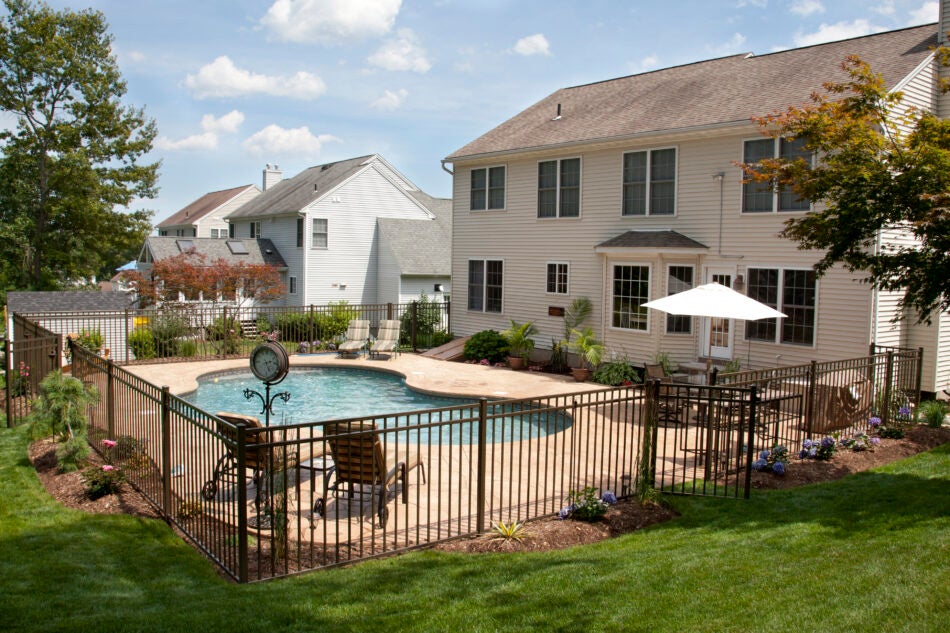Jumping into a cold pool on a hot summer’s day is one of life’s greatest simple pleasures. There are many benefits to having your own backyard pool, but it’s important to remember that with great fun comes the responsibility to make sure everyone is enjoying the water safely.
Whether you are looking to install a new pool or already have one, let’s review how a pool can impact your home insurance premiums and safety responsibilities.
How a pool can impact your home insurance
Understanding whether your home insurance offers protection for your swimming pool should be one of the first things you do before installing a swimming pool or buying a home that has one.
When installing a pool, whether in-ground or above-ground, it is essential to obtain the appropriate permits to ensure compliance with municipal bylaws. In the past, there have been instances where pools were installed without the necessary permits, resulting in structural failures that collapsed retaining walls and caused damage to neighbouring properties.
Pools present the following risks, which can impact your home insurance premium:
- Greater liability risks: Pools pose a drowning risk and wet pool decks increase the risk of slips and falls, making you more vulnerable to liability claims.
- Higher replacement costs: Pools can be expensive to fix — particularly permanent structures like in-ground pools.
- Water damage: Pool leaks, overflows, drainage issues and more can cause water damage to your home and other structures if they’re within close proximity.
Because of these increased risks, your home insurance premiums will usually go up when you install a pool. The cost will depend on the size, location and structure of the pool.
The type of swimming pool you have can also impact what type of insurance you will need.
Above ground pool
These are usually considered personal property instead of a permanent structure since they can be drained and moved. This can limit the amount of financial protection that you have for the pool under your home insurance policy.
In-ground pool
An in-ground swimming pool is usually classified as an “other structure” — similar to a detached garage or sheds. It will typically fall under the “other structures” coverage in your home insurance policy. Because of this, an in-ground swimming pool can increase the value and replacement cost of your property.
It’s important to understand what types of coverage you will need. Would you be covered if your above ground pool flooded your neighbour’s yard and basement? Is there coverage if your pool is damaged by ground movement or frost? Do you need an additional endorsement for your pool?
An Acera Insurance advisor can answer these questions and provide guidance on what types of policy options would work best for your property.
Personal liability risks and pools
There are many benefits of owning a pool, but there is also a higher degree of personal liability risk. Because guests are more likely to be injured on your property, such as a slip and fall on the pool deck that results in a lawsuit, understanding your personal liability coverage is essential.
Personal liability coverage is designed to help cover expenses for legal fees, property damage and medical costs. If someone was seriously injured or drowns while using your pool, you can be found liable if the proper safety precautions haven’t been taken. It’s important to note that this applies even if the person was trespassing.
According to the Canadian National Drowning Report, in 60% of drowning deaths involving private pools, there was either no fence present or the fence didn’t meet safety standards.
Before opening your pool for the season, review your personal liability with an Acera Insurance advisor and see whether it would be beneficial to increase your liability limits.
Practice Pool Safety
To keep people safe while using your pool, practice these tips:
- All adults in the home should have CPR training.
- Have a fence that meets municipal safety standards around your pool with a lockable gate.
- Always supervise children in and around the pool.
- Avoid drinking or taking drugs and swimming.
- Don’t swim alone.
- If your above ground pool has a ladder, remove the ladder when the pool is not in use.
- Ensure all children who have not learned to swim are wearing life vests.
- Keep the pool clear of toys and furniture to prevent tripping.
- Install all diving boards and slides according to the manufacturer’s instructions and follow depth recommendations.
- Don’t allow diving in shallow areas.
- Always have a phone nearby in case of an emergency.
- When your pool is covered for the winter, keep children and pets away. The pool is still dangerous, and accidents can still occur.
Connect with an Acera Insurance advisor
Whether you already have a pool or are considering installing one, contact an Acera Insurance advisor — they can help you navigate your home insurance coverage and ensure you’re getting the best coverage at a competitive price.
Want to learn more about backyard risks?
Learn more about back yard risks that include: barbecues and firepits, play structures and trampolines and the personal liability around hosting an event at your home.
Information and services provided by Acera Insurance, Acera Benefits and any other tradename and/or subsidiary or affiliate of Acera Insurance Services Ltd. (“Acera”), should not be considered legal, tax, or financial advice. While we strive to provide accurate and up-to-date information, we recommend consulting a qualified financial planner, lawyer, accountant, tax advisor or other professional for advice specific to your situation. Tax, employment, pension, disability and investment laws and regulations vary by jurisdiction and are subject to change. Acera is not responsible for any decisions made based on the information provided.

